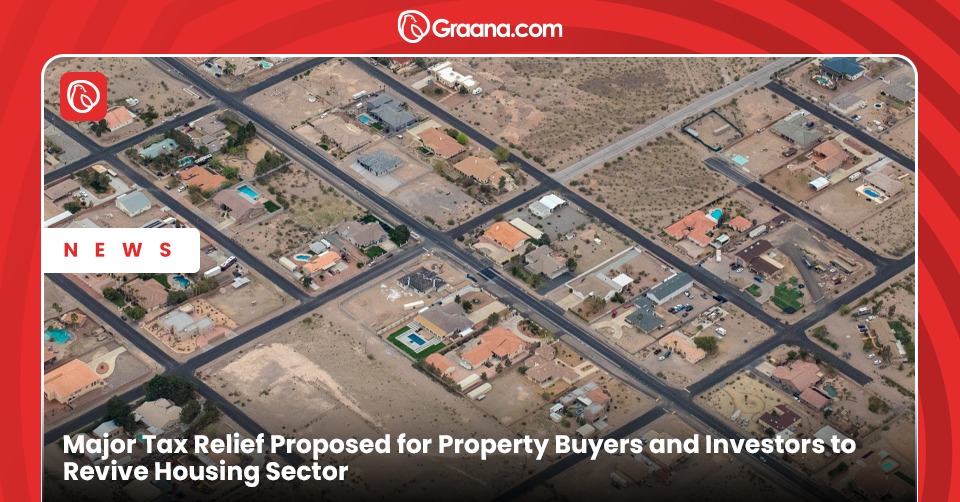
Source: Graana.com
Islamabad, Pakistan — A government task force on housing sector development has put forward a series of ambitious tax reforms and regulatory adjustments aimed at reinvigorating the country’s real estate and construction industries. Among its key recommendations are the abolition of Section 7E of the Income Tax Ordinance, the removal of capital value tax (CVT) in Islamabad, and significant reductions in transaction taxes for property sales. The proposals, designed to stimulate investment, have been finalized for presentation to the prime minister.
A senior official from the Federal Board of Revenue (FBR) confirmed that no amnesty schemes or special tax exemptions for the real estate sector are under consideration. However, authorities cautioned that maintaining the existing 12-13% transaction tax could drive investment abroad. Since the implementation of recent tax hikes, property transactions have plummeted by over 50%, with many now conducted through power of attorney agreements to circumvent tax liabilities.
The task force’s comprehensive recommendations include eliminating Sub-section 2A of Section 236C, which mandates 7E declarations and commissioner approvals, while also advocating for tax exemptions on properties valued up to Rs10 million. Additionally, the proposals suggest shifting non-resident investor verification to an online system via NADRA and introducing a uniform tax rate for both regular filers and late filers to minimize disparities.
Further reforms emphasize the need for standardized and rationalized stamp tax rates across Pakistan’s provinces and the Islamabad Capital Territory (ICT), ensuring uniform taxation policies under the oversight of the National Tax Council. To incentivize investment in the real estate sector, the task force has recommended waiving wealth reconciliation requirements for investments of up to Rs50 million in housing and construction.
One of the central proposals is revising property valuations every three years to better reflect market prices. The task force has also suggested targeted transaction tax exemptions for specific categories, including low-cost housing, government-designated plots, and first-time homebuyers. Recognizing the broader economic impact, officials urged federal and provincial governments to collaborate on lowering transaction taxes in the upcoming budget, arguing that such measures would stimulate growth in the construction sector.
To provide immediate relief and drive investment, the task force has outlined a set of short-term initiatives. These include lowering the policy rate to single digits, reinstating the Mera Pakistan Mera Ghar (MPMG) housing scheme to restore developer confidence, and reintroducing markup subsidies for low-cost housing loans. Additionally, financial literacy campaigns and mortgage financing options are being proposed to encourage broader consumer participation in the housing market.
The task force has also recommended relaxing building regulations to promote vertical development, introducing tax incentives for green construction, and establishing high-density residential zones with relaxed floor area ratios (FAR) to encourage multi-story housing projects. Regulatory approvals for building and housing schemes should be moved to an online system with defined timelines to streamline processes and enhance transparency.
In an effort to make homeownership more accessible to low- and middle-income groups, the task force has proposed defining affordable housing in monetary terms—ranging from Rs50,000 to Rs200,000 per month—to ensure more targeted policy implementation. Additionally, it has called for greater private sector participation through public-private partnerships (PPPs) and joint ventures, a move seen as essential for expanding affordable housing options nationwide.
With Pakistan’s real estate and construction sectors facing significant constraints due to high taxation and regulatory challenges, these recommendations—if implemented—could unlock new investment avenues and drive economic growth. As the government evaluates these proposals, stakeholders in the housing sector remain hopeful that much-needed policy reforms will pave the way for a more dynamic and accessible property market.
Lahore, April 23, 2025 – The city of Lahore has successfully completed the construction of…
ISLAMABAD, Pakistan – April 23, 2025 – Chaaye Khana, Pakistan's popular cafe renowned for its…
ISLAMABAD: Prime Minister Shehbaz Sharif laid the foundation stone for the Murree Road underpass on…
DUBAI: Pakistani real estate developers and representatives showcased a range of commercial and residential investment…
ISLAMABAD: Capital Development Authority (CDA) is currently undertaking a major Rs652 million project to upgrade…
Karachi – Mayor Barrister Murtaza Wahab has announced the launch of a citywide anti-encroachment operation…